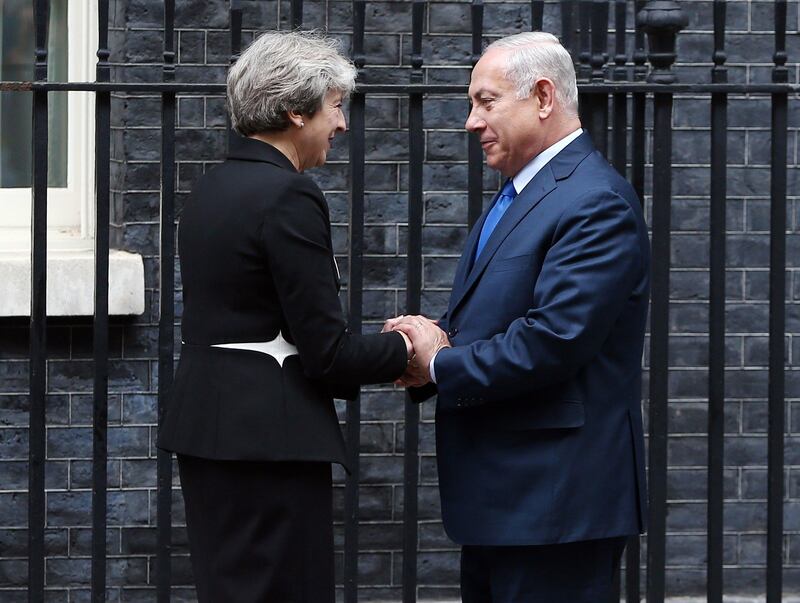London’s world-renowned Black Cabs bore the slogan #Makeitright. Some of the biggest public venues in the capital were hired for commemorative events. And a black tie dinner in the West End hosted two prime ministers and swathe of the elite.
The centenary of the Balfour Declaration, which fired the starting gun for the establishment of the Israeli state in Palestine, was marked on Thursday across Britain in a highly polarised atmosphere.
Theresa May, the prime minister, met with Benjamin Netanyahu in Downing Street having pledged to “mark with pride” Britain’s role in creating Israel.
Facing a backlash for her enthusiastic embrace of the occasion, she also called on her counterpart to display "a renewed resolve to support a lasting peace that is in the interests of both Israelis and Palestinians - and in the interests of us all”.
"A peace deal that must be based on a two-state solution, with a secure and prosperous Israel alongside a viable and sovereign Palestinian state," she said.
Arthur Balfour, the foreign secretary in 1917, sent the defining statement of British foreign policy to Lord Rothschild dated November 2. In just 67 words, it set the tone for the later British mandate to govern Palestine. After the Nazi extermination campaign in the Second World War, the British were driven out of the region as the mandate expired in May 1948 and Israeli independence declared.
In effect a resolution, the letter said: “His Majesty's government view with favour the establishment in Palestine of a national home for the Jewish people, and will use their best endeavours to facilitate the achievement of this object, it being clearly understood that nothing shall be done which may prejudice the civil and religious rights of existing non-Jewish communities in Palestine, or the rights and political status enjoyed by Jews in any other country.”
The Balfour Declaration: A century on

Following the collapse of the Ottomans, the mandate of Palestine was approved in 1920 by the League of Nations and as decades elapsed there was a spike in the number of Jews immigrating to Palestine.
The Black Cab campaign with posters declaring #makeitright was conceived to urge the British public to ensure the entirety of the statement is finally delivered.
“Activists had launched a “make it right” campaign in which 52 black cabs displayed a logo to raise awareness about the consequences of the Balfour Declaration which subsequently led to the forced expulsion of the Palestinians in 1948,” said organiser Lema Nazeeh.
“We are talking about this second part which is not fulfilled, the independent Palestinian state,” said Manuel Hassassian, the Palestinian ambassador in London. “In 1988 we made our painful historic concession in recognising the state of Israel. We Palestinians would have expected the moral and historic responsibility to be shouldered by this government to apologise to the Palestinian people and to go ahead with the second part by recognising the state of Palestine.”
____________
Read more:
The bitter legacy of Balfour - protests in Ramalah, 100 years on
The Balfour effect: British Palestinians on the UK's role in their dispossession
Contrary to popular belief, the Balfour Declaration did not sanction the existence of Israel
____________
Senior Conservatives who have urged the government to go further include Sir Hugo Swire, a former foreign office minister, who told Boris Johnson, Balfour’s successor as foreign secretary, to take the step of recognition in a House of Common’s debate this week.
At a separate, privately-organised, debate in parliament on Thursday, the senior civil servant in the foreign office, Sir Simon McDonald pointed out that his own predecessor in 1917, Lord Hardinge opposed sending the letter.
His caution was that he “distrusted general pledges”.
Sir Simon went on to offer sympathy for the Hardinge position. “He wrote he had concerns about ‘giving encouragement to a movement based on conditions which we cannot enforce’. And he was right,” he said. “The second half of Balfour’s Declaration remains unfinished business.
“This second element said that the British Government clearly understood that ‘nothing shall be done which may prejudice the civil and religious rights of the existing non-Jewish communities in Palestine’,” he said. “If written after the Second World War when the international community developed the rules-based international architecture, the Declaration would have also referred to the political rights and rights to self-determination of these communities too.”
However Mr Netanyahu dismissed any attempts to depict the Balfour Declaration as an error. “The Palestinians say that the Balfour Declaration was a tragedy. It wasn’t a tragedy,” he said. “What’s been tragic is their refusal to accept this 100 years later. I hope they change their mind, because if they do, they can move forward finally to making peace between our two peoples,” he said.
Labour leader Jeremy Corbyn, a long-time critic of Israeli policy towards the Palestinians, declined an invitation to attend the dinner, which is being hosted by Lord Rothschild and Lord Balfour.
Activists hope Mr Corbyn will attend a mass rally on Saturday that starts at the US embassy and ends at Trafalgar Square, which is expected to attract thousands. Organisers have called for a 12-point apology to be read to the crowd from Mr Johnson.
A full page advertisement quoted the words of Arthur Koestler, who said the Balfour Declaration was an act in which “one nation promised to a second nation the country of a third”.






